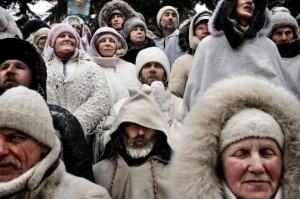When I was a child in Nashville, Tennessee, our public schools were integrated by court order. Bitter opposition followed. One school was burned down. Some Christians said God didn’t mean for blacks and whites to mingle together.
 This period was a beginning, not of leaving my faith, but of finding a more mature faith. Before in my world, Christians were Christians, and the rest was everybody else. Now I began to see graduations within the Christian community as well as in the community of “others.” I found that I could disagree but respect those who differed with me. I am, as the apostle Paul said, still working out my own salvation with fear and trembling.
This period was a beginning, not of leaving my faith, but of finding a more mature faith. Before in my world, Christians were Christians, and the rest was everybody else. Now I began to see graduations within the Christian community as well as in the community of “others.” I found that I could disagree but respect those who differed with me. I am, as the apostle Paul said, still working out my own salvation with fear and trembling.
 I also came to understand that some people who called themselves Christians have committed grievous sins against others. We worship Jesus who, though equal with God, humbled himself to become like us. Yet, in our arrogance, we scream at the different others as though we are God and know perfection. Now I am more aware of my own potential for error and am more willing to listen to other viewpoints.
I also came to understand that some people who called themselves Christians have committed grievous sins against others. We worship Jesus who, though equal with God, humbled himself to become like us. Yet, in our arrogance, we scream at the different others as though we are God and know perfection. Now I am more aware of my own potential for error and am more willing to listen to other viewpoints.
 I find no fault in Jesus, but I fear that we have clung, not to Jesus and his radical love, but to something less, Christianity as a mere civil religion. Perhaps that is why Christianity is no longer the default religion in the Western world.
I find no fault in Jesus, but I fear that we have clung, not to Jesus and his radical love, but to something less, Christianity as a mere civil religion. Perhaps that is why Christianity is no longer the default religion in the Western world.


 We did not clap during the Good Friday concert at my church last night. It was a somber concert, about grief over the loss of loved ones, but with a tinge of hope that wove a few colors though the black tapestry. We left silently and went home.
We did not clap during the Good Friday concert at my church last night. It was a somber concert, about grief over the loss of loved ones, but with a tinge of hope that wove a few colors though the black tapestry. We left silently and went home. We will pull the black from the windows, the lights will come on, and the brass instruments and the violins and the organ will blaze the message, “He is risen!” and we will sing our alleluias for the first time in forty days.
We will pull the black from the windows, the lights will come on, and the brass instruments and the violins and the organ will blaze the message, “He is risen!” and we will sing our alleluias for the first time in forty days.